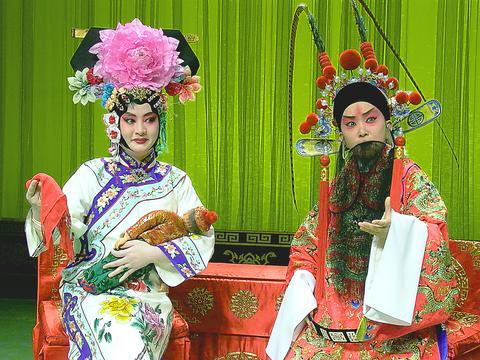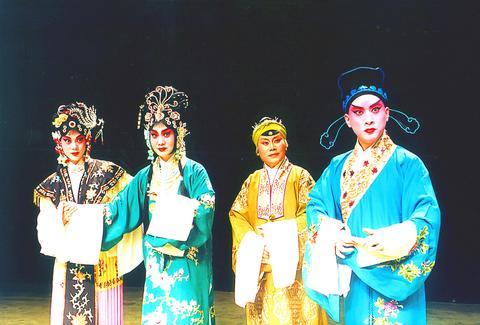The Shanghai Beijing Opera Theatre ( 海
Formed in 1955, the Shanghai Beijing Opera Theater has 77 full time performers and is one of the most well traveled opera troupes in China. Since being founded almost 50 years ago the troupe has not only performed widely at home, but has also toured extensively throughout Asia, the Americas and Europe.

PHOTO COURTESY OF ARTS FORMOSA
Originally staged only for the Emperor and his immediate family, the art form now known as Beijing Opera was developed from an amalgamation of several regional operatic styles and forms some time in the late 1700s. It is widely believed that Beijing Opera was born shortly after four Anhui-based opera troupes went to Beijing in 1790 and began to blend their styles with those of troupes from Hubei.

PHOTO COURTESY OF ARTS FORMOSA
Outlawed during the Cultural Revolution, traditional Beijing opera was brought back from the brink of it demise in 1978, when Communist authorities once again allowed artisans to stage non class struggle related productions. Opera's out-of-date styles and the younger generations lack of historical and theatrical knowledge apropos Beijing opera meant that the art form never regained the prominence it enjoyed during the pre-Cultural Revolution era, however.
In a bid to ensure that the two-centuries old tradition survives for another 200 years, the young group, with an average age of 30, undertakes educational tours of schools and colleges throughout China, where it performs and teaches operatic techniques to students.
As the first major Chinese operatic touring group to perform in Taiwan in almost two years, the Shanghai Beijing Opera Theatre will be hoping to create something of a renaissance of Beijing opera when it takes to the stage to perform the first of 10 colorful and stylized productions next Tuesday.
Performances by the troupe will include Forth Son Visits his Mother (四
Along with the performances of entire operas the troupe will also be holding a special concert entitled Beijing Opera Virtuoso Solo, which will feature arias from a many of the most well known of all the many hundreds of Beijing operas.
Performance notes:
What: Shanghai Beijing Opera Theater (
Where: National Theater (
When: Tuesday, Aug. 10 through Sunday, Aug. 15.
Tickets: Tickets cost from NT$300 to NT$2,000 and are available from ERA Ticketing or direct the CKS Cultural Center box office.

In the March 9 edition of the Taipei Times a piece by Ninon Godefroy ran with the headine “The quiet, gentle rhythm of Taiwan.” It started with the line “Taiwan is a small, humble place. There is no Eiffel Tower, no pyramids — no singular attraction that draws the world’s attention.” I laughed out loud at that. This was out of no disrespect for the author or the piece, which made some interesting analogies and good points about how both Din Tai Fung’s and Taiwan Semiconductor Manufacturing Co’s (TSMC, 台積電) meticulous attention to detail and quality are not quite up to

April 21 to April 27 Hsieh Er’s (謝娥) political fortunes were rising fast after she got out of jail and joined the Chinese Nationalist Party (KMT) in December 1945. Not only did she hold key positions in various committees, she was elected the only woman on the Taipei City Council and headed to Nanjing in 1946 as the sole Taiwanese female representative to the National Constituent Assembly. With the support of first lady Soong May-ling (宋美齡), she started the Taipei Women’s Association and Taiwan Provincial Women’s Association, where she

Chinese Nationalist Party (KMT) Chairman Eric Chu (朱立倫) hatched a bold plan to charge forward and seize the initiative when he held a protest in front of the Taipei City Prosecutors’ Office. Though risky, because illegal, its success would help tackle at least six problems facing both himself and the KMT. What he did not see coming was Taipei Mayor Chiang Wan-an (將萬安) tripping him up out of the gate. In spite of Chu being the most consequential and successful KMT chairman since the early 2010s — arguably saving the party from financial ruin and restoring its electoral viability —

It is one of the more remarkable facts of Taiwan history that it was never occupied or claimed by any of the numerous kingdoms of southern China — Han or otherwise — that lay just across the water from it. None of their brilliant ministers ever discovered that Taiwan was a “core interest” of the state whose annexation was “inevitable.” As Paul Kua notes in an excellent monograph laying out how the Portuguese gave Taiwan the name “Formosa,” the first Europeans to express an interest in occupying Taiwan were the Spanish. Tonio Andrade in his seminal work, How Taiwan Became Chinese,